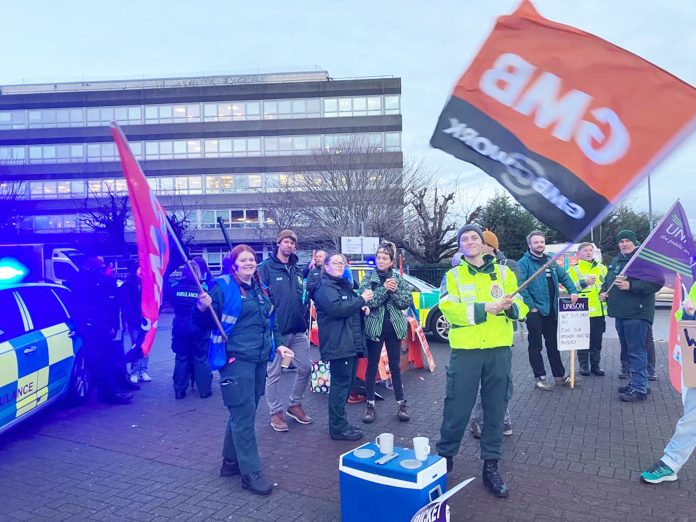Rob Rooney, Cornwall Socialist Party
On strike to save the service so it can save lives, and taking a day out of the insane, dysfunctional, imploding world of the NHS, ambulance crews were on the picket line in St Austell, as part of the Unison and GMB strike action on 21 December.
Passing motorists hooted their support, while others stopped and dropped gifts off to the strikers who were huddled around a brazier.
Chris Kent, an emergency care assistant (ECA) and Unison member, recalled how the obscene queueing of ambulances, laden with patients, at hospitals around the country, started around 18 months ago.
Chris described what is a common experience. “We can take the place of another crew and sit there all day and all night with a patient. Then another crew will take that patient off us so we can go home but the patient stays in the ambulance.
“We’re sat there, listening to the radio constantly requesting a crew for a ‘category one’ (highest alert level), and there’s none available in the whole county because they’re stuck at hospital.”
The procedure for category one calls illustrates how increased risk for patients is now built into the system. A crew stuck waiting at a hospital with a patient gains permission to offload the patient while attending to the emergency.
While the crew is absent, the patient goes through triage (initial assessment), but is then “pushed back out onto an ambulance” to await a bed.
ECAs are supposed to go out with a paramedic but that does not always happen because of the strain on the system. Chris said: “It’s becoming more frequent for ECAs to form a crew with no paramedic support. You can go to a job, request paramedic support, and none is available because they’re tied up at hospital.”
I asked newly qualified paramedic, Sammy Johns, a GMB member, why she was on the picket. She said: “For fairness. It’s not about pay, we do it for the love of the job.
“We are seeing people die in front of our eyes because we are not getting to them. We’re sat outside the hospital, hearing there is a cardiac arrest and nobody is going to them. It’s soul-destroying.”








